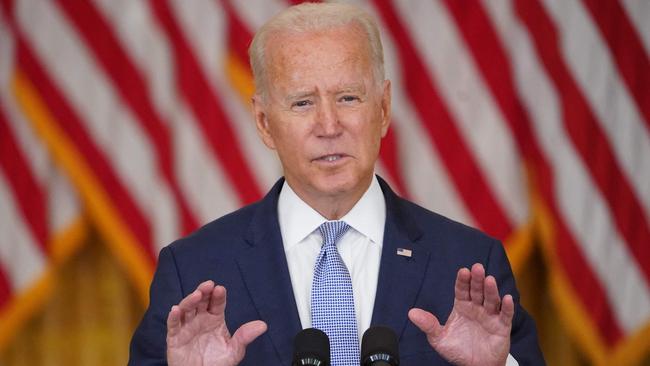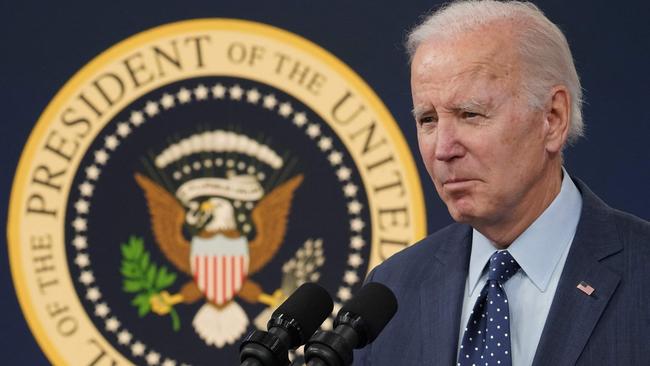Shares rebound on dovish Fed but the Israel crisis muddies the outlook
Volatility in global markets is expected to endure and there’s potentially even more risk to the downside for shares, strategists say.

Shares rebounded further as Fed officials downplayed the need for further rate rises and oil prices cooled despite the risk of a wider Middle East conflict after Hamas’s attacks on Israel.
But it’s still early days in the crisis that erupted over the weekend. Global markets are likely to remain volatile with potentially more risk on the downside for shares, according to strategists.
The S&P 500 hit its highest level in almost three weeks and Australia’s S&P/ASX 200 had its best day in almost four weeks after Fed vice-chair Philip Jefferson said the Fed was “in a position to proceed carefully in assessing the extent of any additional policy firming that may be necessary”.
The rise in shares came amid light trading while the US bond market was closed for Columbus Day. US PPI data is due on Wednesday and CPI data is out on Thursday.
Crude oil prices paused after jumping more than 5 per cent on the tragic events in the Middle East.
European natural gas prices soared 15 per cent after a leak was found in an undersea gas pipeline in the Baltic and as Chevron was forced to shut a major offshore gas field in the eastern Mediterranean. Israeli Prime Minister Benjamin Netanyahu has said he instructed the Israel defence forces to prepare for a mass offensive against Hamas at an intensity that hasn’t been seen before, and ordered a total blockade, effectively banning food, fuel and electricity to the region.

Joe Biden released a joint statement with the leaders of France, Germany, Italy and Britain in support of Israel, and the White House said the US President planned to deliver remarks on Wednesday on the terrorist attacks in Israel.
Mr Biden met on Monday with members of his national security team, including Secretary of State Antony Blinken, directing them to co-ordinate with Israel “on all aspects of the crisis”.
Independent researcher Gavekal said that, while the impact on global markets should be muted if the conflict was largely limited to Israeli reprisals against the Gaza Strip, “the general perception is that the weekend’s events were Israel’s 9/11”, which led the US to invade Afghanistan and Iraq.
“Given the scale of the outrage, it will be hard for the ideologically hawkish government of Prime Minister Benjamin Netanyahu to not hit back against its enemies and their backers, and those backers include Iran,” Gavekal chief executive Louis-Vincent Gave said.
“This does not mean that Israel’s next step will be to strike Iran. But at the very least, Israel will ask the administration of Joe Biden to start to apply US sanctions against Iran in earnest.”
Mr Gave outlined three possible scenarios for the crisis.
The first, which the market appears to be running with for now, is one where Israeli defence forces crush Hamas in Gaza, Hezbollah largely stays out of the war, and little action is taken against Iran.
“Even if the human toll is horrendous, in this scenario financial markets quickly forget about the event,” Mr Gave said.
A second possible scenario was one where the West ramps up sanctions against Iran, but under US pressure Saudi Arabia and the United Arab Emirates make up the oil shortfall.
“In this scenario, energy prices prove volatile at first and then grind higher – if only because with Saudi pumping at close to capacity and the US Strategic Petroleum Reserve depleted, the market starts to worry about the lack of excess supply,” Mr Gave said.
“Bonds likely sell off further (as) bond markets don’t usually like wars and higher energy prices – and equity markets everywhere come under pressure.”
A third, more worrying scenario was one where the West ramps up sanctions against Iran, or worse, Israel launches overt military strikes against Iran, but Saudi Arabia refuses to crank up oil production.

“Basically, this is 1973 all over again: a disaster for global bonds and for equity markets, made worse because this time the world will be dealing with the war in Ukraine as well as a new conflict in the Middle East,” Mr Gave said. “In this scenario, Europe would be in a very precarious position.”
“For investors, the only things to own will be energy, precious metals and assets in nonbelligerent commodity producers such as Brazil, Chile, Colombia or Indonesia.”
White House national security spokesman John Kirby accused Iran of being “complicit” with Hamas’s attack on Israel, while noting that the US did not have “specific evidence” of Iran’s involvement.
“If the US finds evidence directly implicating Iran, then the immediate reduction in Iran’s oil exports becomes a reality,” said CBA’s director of mining and energy commodities research, Vivek Dhar.
“We continue to believe that Brent oil will ultimately stabilise between $US90 and $US100 a barrel in the December quarter.
“The Palestine Israel conflict raises the risk of Brent futures tracking at $US100 and above.”
Meanwhile, Morgan Stanley US equity strategist Michael Wilson said constraints on US fiscal policy would limit any potential policy response in the US at a time when “cyclical risks persist”.
“We continue to think the current backdrop is very different from the past 30 years from a policy standpoint with fiscal dominating monetary policy,” Mr Wilson said.
“Fiscal policy has been a key driver of inflation and growth this cycle and is now at risk of being constrained by budgetary limits and a partisan political environment, even within parties.
“On this front, the repricing of the bond market term premium is a critical issue for investors. Equity valuations have adjusted, but continue to face headwinds amid weak breadth, elevated real rates and cyclical risk, particularly in the absence of a near-term policy catalyst.”
Canaccord Genuity chief market strategist Tony Dwyer said any “oversold rally” in the US sharemarket should “ultimately prove temporary as nothing fundamentally has changed in credit.”




To join the conversation, please log in. Don't have an account? Register
Join the conversation, you are commenting as Logout